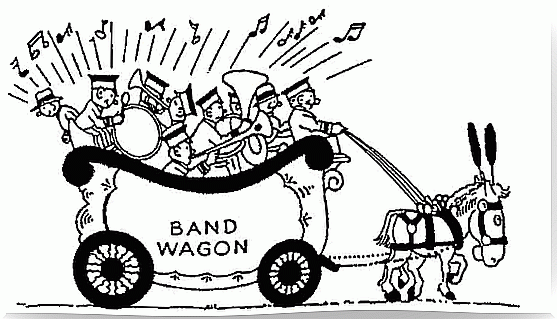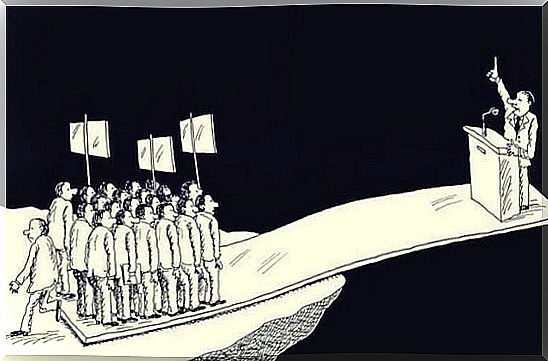Bandwagon Effect: To Follow The Majority

As Facundo Cabral once said, “we should eat grass, millions of cows can not be wrong.” He refers to the irony of following the majority without thinking critically. In other words, to follow other people just because they are the majority. This is in cognitive terms known as the bandwagon effect.
More precisely, the bandwagon effect is the belief that something is true just because the majority believe it to be true. People who fall victim to this way of thinking do not base their judgment on logical thinking, but rather on the pressure of the masses. If so many people think so, then it must be true.
Politicians know best of all the bandwagon effect. There are hundreds of studies that show how politicians take advantage of this erroneous reasoning to impose on us “truths” that have nothing to do with truth. It usually occurs during election campaigns. People will believe that the person conducting the statistical survey is the best, even if they have no idea what they stand for or the validity of their claims.
The first to consciously use the term “bandwagon effect” is the North American Dan Rice, 1848. During that year’s presidential campaign , Rice used the term “jump on the bandwagon” to say “come on board with everyone else.” This is how he helped President Zachary Taylor gain power.

During this time it became clear that a phrase like this had a great power to affect the already large masses. This created a great domino effect, in other words, became contagious. People wanted to be updated and involved in the current trends,
Slowly but surely, people began to understand that the bandwagon effect could result in enormous political benefits. People always want to be on the winning side. Therefore , they can unite with the one who has the most followers, whether it is a politician or another person. This creates a climate where everything reinforces the leading person.
The people’s argument (argumentum ad populum) is a false statement that does not represent the opinion of the majority. When he spoke on the subject, Carl Sagan once mentioned when he was reprimanded by a taxi driver. The driver asked him if he believed in a UFO and Sagan replied that he did not. The driver’s reaction was distancing and skepticism.
The driver thought that Sagan was hiding his true opinion. If he had said he believed in aliens, even if it had been a lie, he would have received the driver’s approval.

Therefore, this type of argument is closely related to the bandwagon effect. Politicians and marketing experts almost always try to simply tell people what they want to hear. It does not matter if it is true or not. What they care about is reflecting popular arguments and thus gaining the sympathy of the masses.
But it is not so easy for people in power. It is not enough to just pull the lies needed to get the majority vote. The bandwagon effect is a double-edged sword. Becoming the most popular also means becoming the most betrayed by the masses. Any little revelation can have a devastating effect on their reputation. Everyone is much more attentive to the driver of the winning train.
In addition, any other candidate may create an even stronger trend. Because people do not follow a leader out of conviction but simply based on the bandwagon effect, they can easily turn their backs on the one who seems weaker according to their logic. If someone else succeeds in presenting themselves as a possible winner, many can simply switch to him and abandon their first choice.

The bandwagon effect has also been referred to as sociable behavior and mass behavior. It is important that we are aware of this so that you do not fall victim to someone who does not sell anything but lies.









